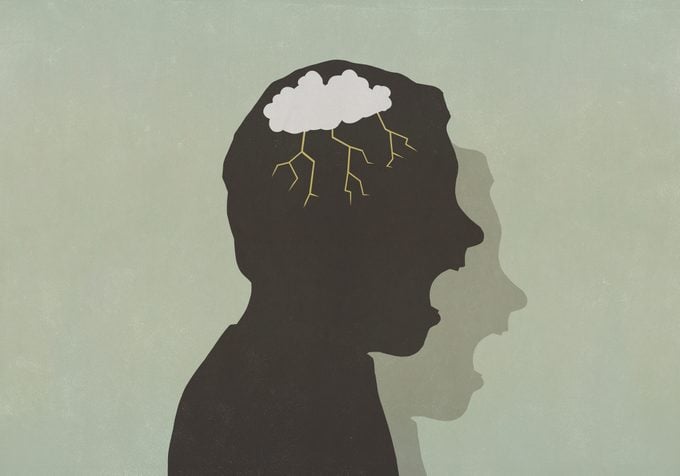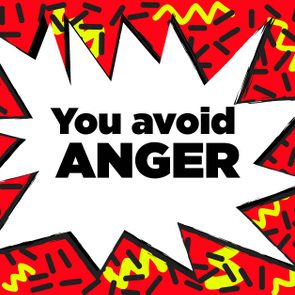What Science Knows About Anger—and What to do About It
Updated: Jun. 21, 2021
Wondering how to deal with your anger issues? We spoke with anger management experts to find out why people get angry—and how best to deal with it.
Understanding anger issues
Whether it’s outrage as a result of the news or a more personal reaction following strife with your friends, family, or co-workers, anger issues are something we’re all familiar with. Yet few of us truly have a handle on anger.
What is anger anyway? Is it the same as rage or cynicism? Or is it something else entirely?
“Anger is an uncomfortable emotion we experience when we perceive that a threat is present,” says child psychologist Nicole Beurkens, PhD. “This can include experiencing an unpleasant or unexpected negative event, feeling an injustice has been done, or that someone has wronged us. Anger is an emotional response to a real or perceived triggering thought or event.”
Anger specifically tends to be present when there’s a feeling of unfairness or being misunderstood, adds Beurkens.
But although anger might be scary—whether it’s yours or coming from others around you—it can also be cathartic and have some emotional benefits. “It’s important to remember that anger is a normal and appropriate emotion under certain circumstances,” says Beurkens.
Here, we spoke with experts to get the lowdown on everything anger-related.

Why do we get angry?
Anger is an emotional response to a stressor or threat in your environment and can be triggered by frustration or to hide vulnerabilities such as fear, shame, or grief, explains Jeffrey Ditzell, DO, a psychiatrist in New York City.
The root of anger lies in the brain, usually as a reaction to the release of cortisol when we feel endangered in some way. “Sometimes referred to as the ‘fight or flight’ hormone—despite the fact that it can actually cause several different responses, not only two—anger is the base of that ‘fight’ reaction as we work to protect ourselves when we feel threatened,” says Deborah Gilboa, MD, a resilience expert in Pittsburgh.
Once anger starts, it recruits testosterone, Dr. Gilboa explains, adding that it’s not just men who have this hormone (although they tend to produce higher levels). “The larger the amount, the harder it can be to regulate anger reactions.”
But just as people are complex and unique, so is anger.
“There are so many reasons why irritation builds and bubbles over to anger for people and no two people have the same triggers,” says Roseann Capanna-Hodge, PhD, a psychologist and integrative mental health expert.
“Anger in and of itself is often a symptom of something else: unresolved issues, a clinical issue such as anxiety, depression, OCD, or a personality disorder,” says Capanna-Hodge. “Anger may just be a sign of frustration with a person or event when someone is unable to communicate their feelings in a healthy way.”
Other potential reasons you get angry? High levels of chronic stress, as well as feelings of powerlessness or being threatened. And even other common other negative states may make anger more likely, including sadness, stress, hunger, and not enough sleep.
(Don’t miss how this woman fought addiction and trauma and healed from her anger and abuse.)
Why do some people get angrier than others?
Anger is a normal, common human emotion, and not something to be ashamed of. Some people are able to curb their anger or handle it well. For others, however, anger happens frequently or can lead to rage or violence. Why?
When you feel threatened, some people naturally experience a desire to run away from the risk, while others feel overwhelmed and freeze, explains Dr. Gilboa. Others, without well-honed self-regulation skills, may lash out.
“The reasons behind these varied responses have to do with a person’s values, previous experiences, and their resilience skills,” Dr. Gilboa says.
Anger is a protective emotion, explains Lara Effland, a licensed clinical social worker and clinical director with Pathlight Mood & Anxiety Center.
“Some people feel more comfortable or stronger when they are angry, versus when they’re scared or sad,” she says. “Anger is also a learned response, so we may have seen others present with it rather than with other more vulnerable emotions. As a result, it may feel like second nature to some folks to respond or lash out in anger.”
Personality
Differences in anger are primarily due to differences in personalities.
“Depending on personality traits, some people may feel anger more quickly and intensely,” Beurkens says. “This causes them to be more reactive and to lash out more quickly. Others are more laid-back, and take angry feelings in stride without reacting as quickly or intensely.”
(Learn why controlling your anger may help you live longer.)
Childhood
What’s been modeled for us in childhood also tends to play a role in how we experience and react to anger, Beurkens explains. “If a parent or adult in your household when you were young was easy to anger or responded to it quickly and negatively, you may have adapted that reaction.”
If your parents, nannies, or caretakers had more measured responses and were less reactive to angry feelings, you are less likely to have frequent or intense emotional reactions of your own.
Self-regulation
Self-regulation is important when it comes to anger, says Capanna-Hodge. Self-regulation is the ability to recognize and monitor your emotions and regulate your behavior to fit the situation.
Emotional dysregulation, on the other hand, is the inability to control emotional responses to triggers, which can cause problems with relationships and the ability to function in daily life.
Capanna-Hodge notes that emotional dysregulation can cause the nervous system to be in a constant state of overactivation in some people.
“Right out of the gate, they view stressors differently, so they are more reactive to seemingly benign irritants or changes in their world,” she adds. “And when you are constantly irritated and stressed, angry outbursts are simply more likely to occur.”
(Full of anger? Here are 24 things you can do to calm down.)
How does the brain respond to anger?
There are three main systems in the brain that are involved in how people respond to a threat, explains Capanna-Hodge.
They include the amygdala, a collection of cells in the base of the brain that processes fear and emotion; the HPA axis, which is the hypothalamus, pituitary gland, and adrenal glands, which are glands that sit on top of the kidneys and produces stress-response hormones like cortisol; and the frontal lobes, which control high-level functions like problem-solving and judgement.
When your brain perceives a threat, the amygdala triggers an alarm-like hormone response. A surge of energy follows as you prepare for fight or flight, says Capanna-Hodge, and depending on your ability to pump the brakes via the frontal lobes, you’ll either react or not.
“Once highly activated or angry, it is pretty difficult to apply the breaks, as the primitive brain is designed to protect itself from a perceived threat,” she says.
Brains have naturally evolved to display anger as a protective response to these perceived threats.
Capanna-Hodge explains that your body and brain work together to jump to action, causing “your body to release adrenaline, your heart rate and blood pressure to increase, your senses to sharpen, and your muscles to react.”
(There are 9 different types of anger. Which one is yours?)
Is there a link between depression and anger?
While there aren’t recent studies showing a link between depression and anger, older studies—including one published in 2009 in Advances in Psychiatric Treatment—have pointed to links.
Depression can block emotional self-regulation pathways, Dr. Gilboa explains. “Individuals who would feel some anger, and still choose a more modulated response, will have more trouble stopping their irritability or anger reaction, and will exhibit more behaviors fueled by that anger.”
Capanna-Hodge has worked with children on their anger issues and frequently sees it as a symptom of depression. “When it comes to depression, there are a range of symptoms,” she says. On one end, there are those who internalize depression and on the other end are those who externalize it. “Externalizing depression shows itself as angry outbursts,” says Dr. Gilboa. These outbursts can be verbal or physical.
Irritability is a component of anger and also a hallmark trait of depression. “There can be a cycle that develops for people with depression or anxiety, where they feel angry as a result of their other symptoms and having a sense of not being able to escape them,” Beurkens says.
While there can be a link between depression and anger, it’s not a given for all people. (Don’t miss this woman’s story about coping with anger and grief after losing her son in the Sandy Hook shooting.)
Is there a link between anxiety and anger?
In a study published in 2017 in the Journal of Child and Adolescent Counseling, researchers found a link between elevated rate and intensity of anger in youth with anxiety disorders.
“When broken down, it makes sense that someone struggling with anxiety may display signs of anger,” Dr. Ditzell says. “We tend to get angry when we have control taken away from us. Anxiety can be that very thing—feeling like we have no control over the endless cycle of worrying that is going on in the mind.”
There can indeed be a link between anxiety and anger, says Dr. Gilboa.
“Anxiety leads to a state of chronic over-vigilance, and a sense that one is in danger even when others might not see the cause of that fear,” she explains. “For a person who has anger responses to threats, anxiety would make them more likely to be in that heightened state and therefore respond with anger.”
Anxiety often manifests as feeling uncertain or fearful, which can lead to a secondary feeling of anger.
“When it comes to anxiety, that same anger you see in depression can be witnessed in people who excessively worry or have intrusive thoughts,” says Capanna-Hodge. “For an anxious person, the anger is a reflection of their overriding need to push away anymore uncomfortable feelings or sensations. When highly anxious, they already are at maximum capacity and their survival instincts kick in and cause them to aggressively fight off more stress, whether perceived or real.”
(Are you always in a bad mood? Here are 8 possible reasons why.)

What’s a healthy way to deal with anger?
“Anger is a valuable emotion. It lets us know when we feel threatened in any way,” Dr. Gilboa says. “Recognizing it and looking for the cause is not only acceptable, it’s healthy because it causes us to set good standards for our own safety and how we want to be treated.”
Accept that anger is normal
“Recognizing anger, interrogating that response in ourselves and accepting the feelings as normal and useful are all healthy reactions,” explains Dr. Gilboa.
It’s important to learn to recognize and get in touch with your emotions. “This can help you realize that sometimes it’s not actually anger you’re feeling, and can lead to learning skills for managing those other feelings,” says Beurkens.
That’s true even in children. When they’re struggling with anger or uncomfortable emotions, the sooner a parent or guardian can help them will anger management skills, the healthier they’ll be able to deal with this emotion as an adult.
Find positive ways to blow off steam
Further, finding positive or neutral ways to “blow off steam” is a necessary resilience skill. “When we learn ways we can manage the discomfort of feeling angry without damaging ourselves or anyone else, we build our ability to navigate future difficulties and to improve our relationships,” says Dr. Gilboa.
Because anger is a natural feeling, there are healthy, natural ways to manage those feelings.
“Anger is a natural feeling and there are absolutely healthy ways to manage those feelings. When feeling anger, the first thing to do is to feel that emotion and process it,” suggests Capanna-Hodge. “Trying to shove it down is not only unhealthy, but it will creep up sooner or later when you aren’t prepared. Take a moment to breathe and think about what the trigger was and how you could handle the situation. Looking at the ‘why’ behind your anger can help you to break that pattern.” These anger management products can also help you to keep calm and process your emotions in a healthy manner.
Change patterns
You can change what you associate pain and anger with, says Craig Siegel, life coach and owner of Cultivate Lasting Sympathy.
“Instead of reacting a certain way, you can change your patterns,” says Siegel. “For example, if you had a nasty divorce, you don’t have to get angry when you think of the past and your ex-spouse. You can choose to be indifferent towards that particular person. This results in less frustration and, more importantly, having a grip on your emotions.”
Siegel also recommends a more lighthearted approach. “You can change the tonality of the voice in your head from something scary and intimidating to something goofier and less frightening, such as a cartoon character,” he says. “This sounds a little weird, but trust me, it’s very effective. Try it.”
Name it to tame it
Identifying your anger can help quell it. Even just saying to yourself “I am feeling angry,” when you notice it can help to distance yourself from the angry thoughts you’re experiencing and help to separate you from it.
“The healthiest way to deal with anger is to notice it, give it space, try to focus on the event or the cause rather than the reaction to the situation or the fact that it caused you to be angry,” Effland says. “Talk about it. Seek another perspective. Try to understand it from the other person’s point of view. Find acceptance in the chaos or loss of control you may have experienced.”
Seek professional help
There are many healthy tools you can use to manage an anger response, including working with a professional.
“Learning to take time to process the situation and respond rather than react is helpful in limiting an angry outburst,” Dr. Ditzell says. “Working with a trained mental health professional can be beneficial in understanding where your anger is coming from and learning mechanisms to recognize misplaced emotions.”
What are some unhealthy ways to deal with anger?
When you’re angry, you may be tempted to lash out in aggression. Don’t. Not only could you end up in a dangerous situation, but according to a study published in the Journal of Personality and Social Psychology, it will only make you feel worse, not better.
Violence
“Anger is often used as an excuse for negative, or damaging coping mechanisms,” says Dr. Gilboa. “Violence against people, objects, or ourselves can all be fueled by anger.”
And there can be a snowball effect with this type of negative behavior.
“Lashing out verbally or physically is never a good idea when you are angry,” Capanna-Hodge says. “These kinds of behaviors are unhealthy for many reasons but ultimately it can cause further pain such as the ending of a relationship or employment, school difficulties, or even worse legal difficulties.”
Substance abuse
Another classic way of coping with anger involves drinking too much or abusing drugs.
“Substance use and risky behaviors are also examples of self-harm and just endanger the angry person more,” says Dr. Gilboa. While it can feel good in the moment to help dull the pain and anger, it also can damage relationships without addressing the root causes of anger or behavior.
Can you learn to be less angry?
While it might seem difficult to learn how to lessen your anger, anger management is possible, with baby steps.
“In any given situation a person can learn to regulate their emotions to a degree,” Dr. Gilboa says. “The first necessary step in emotional regulation, however, is self-empathy: accepting the feeling and recognizing your right to feel that way.” Rather than diving headfirst into toxic positivity, give yourself permission to feel upset.
After acknowledging your negative emotions, however, it’s helpful to work through techniques such as mindfulness, communication, or distraction to extinguish those feelings, Dr. Gilboa says.
Be less reactive
“Working on your mindset and how you view stressors is a powerful way to improve your mental health,” adds Capanna-Hodge. “When we work on being less reactive, things just don’t bother us in the same way. That means that irritation and anger are simply less likely to occur.”
Siegel views himself as living proof that it’s possible to deal with your anger issues, having dealt with a cocktail of negative emotions after his father was diagnosed with cancer.
“My initial reaction was anger and sadness. Being sad is reasonable and sometimes necessary. Being angry, however, is unproductive,” Siegel says. He channeled his anger into running, ultimately completing four marathons last year. “By identifying my passion and purpose, I was able to remove anger from my mindset and cultivate a constant state of gratitude which I now live in on a daily basis.”
At the end of the day, the old cliché has a ring of truth to it: You can’t necessarily control what happens to you, but you can control how you react to it.
“What you allow yourself to become angry at is a choice,” Siegel says.
Next: Had a bad day? Here are 7 ways to unwind (that don’t involve cocktails or cookies).




















